-
 +17 +1
+17 +1Creating a throw-away culture: How companies ingrained plastics in modern life
Plastic has become embedded in everyday life. That’s because for the last 70 years, the plastics industry convinced consumers to embrace the material for its low cost and disposability.
-
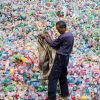 +26 +1
+26 +1Recycling Doesn’t Work—and the Plastics Industry Knew It
The industry knew decades ago that recycling was never viable in the long term, and now we’re all being poisoned by its product.
-
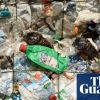 +26 +1
+26 +1‘They lied’: plastics producers deceived public about recycling, report reveals
Companies knew for decades recycling was not viable but promoted it regardless, Center for Climate Integrity study finds
-
 +50 +1
+50 +1The world is awash in plastic. Oil producers want a say in how it's cleaned up
Almost every piece of plastic is made from fossil fuels. Fossil fuel companies, plastic producers and some consumer goods companies could weaken the treaty.
-
 +35 +1
+35 +1Sorry, Your Paper Coffee Cup Is a Toxic Nightmare
Supposedly eco-friendly cups are still coated with a thin layer of plastic, which scientists have discovered can leach chemicals that harm living creatures.
-
 +21 +1
+21 +1Recyclers reject most plastic. This company turns it into furniture.
Packaging for lotion, toothpaste, and makeup is a recycling disaster. But ReFactory, a UK-based family business, has a complex process to give it a new life. It makes plywood-like plastic boards and turns them into furniture, planters, and more.
-
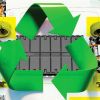 +26 +1
+26 +1Can EV Batteries Be Recycled? It’s Complicated, But It’s Already Happening
How we'll keep all those toxic, expensive materials from going to waste.
-
 +37 +1
+37 +1‘I spot brand new TVs, here to be shredded’: the truth about our electronic waste
In a giant factory in California, thousands of screens, PCs and other old or unwanted gadgets are picked apart for materials. But what about the billions of other defunct (or not) devices?
-
 +4 +1
+4 +1Recycling can release huge quantities of microplastics, study finds
Scientists find high levels of microplastics in wastewater from unnamed UK plant – and in air surrounding facility
-
 +18 +1
+18 +1Yet Another Problem With Recycling: It Spews Microplastics
Recycling was already a mess. Now a study finds that one facility may emit 3 million pounds of microplastics a year.
-
 +26 +1
+26 +1Plastic wrap made from seaweed withstands heat and is compostable
A thin material made from seaweed can handle high temperatures but only takes a few weeks to break down in a composting bin
-
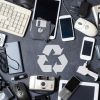 +28 +1
+28 +1Apple to Use 100 Percent Recycled Rare Earth Elements by 2025
Multinational technology company Apple will use 100 percent recycled rare earth elements for magnets in its devices by 2025. Silicon Valley giant Apple announced last week to boost the use of recycled cobalt for all Apple-designed batteries and recycled Rare Earth Elements (REE) for magnets to 100 percent by 2025. Additionally, the company estimates that all Apple-designed printed circuit boards will use 100 percent recycled tin soldering and 100 percent recycled gold plating by that time.
-
 +16 +1
+16 +1Turning food waste into biodegradable bioplastics
The outcome of this three-year project will be a process that delivers marketable bioplastic products made from food waste. The reusability of food waste for bio-based plastic production could help reduce landfill quantity and waste management costs, offset petroleum-based plastic production and pollution, and minimize greenhouse gas emissions.
-
 +18 +1
+18 +1How chemists are tackling the plastics problem
New research could help turn a mix of plastic waste into new products.
-
 +15 +1
+15 +1Researchers 3D-printed a fully recyclable house from natural materials
With the United States facing a historic housing shortage, researchers from the University of Maine believe they may have found a solution to the problem. Using one of the world’s largest 3D printers, the university’s Advanced Structures and Composites Center (ASCC) recently created the first 3D-printed home made entirely of bio-based materials.
-
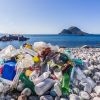 +12 +1
+12 +1Why Plastic Pollution Is a Producer Responsibility
We won’t be able to stem the tide of plastic waste until manufacturers are held accountable for their products.
-
 +19 +1
+19 +1Only 5% of plastic waste generated by US last year was recycled, report says
Only 5% of the mountains of plastic waste generated by US households last year was recycled, according to new research by Greenpeace. Americans discarded 51m tons of wrappers, bottles and bags in 2021 – about 309lb of plastic per person – of which almost 95% ended up in landfills, oceans or scattered in the atmosphere in tiny toxic particles.
-
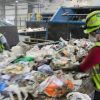 +26 +1
+26 +1Plastic recycling a "failed concept," study says, with only 5% recycled in U.S. last year as production rises
Greenpeace USA blasted industry claims of creating an efficient, circular economy as "fiction."
-
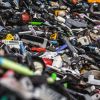 +21 +1
+21 +1There's progress on right to repair, but is it enough?
Mountains of old phones, tablets, laptops, smart speakers, headphones, and assorted gadgets are leaching harmful chemicals into soil around dumps worldwide. That is, until they’re ready to get incinerated, at which point they’ll birth plumes of airborne toxins and endanger people in the developing world — all for the sake of a few nuggets of recovered semi-precious metals.
-
 +4 +1
+4 +1A startup is using recycled plastic to 3D print prefab tiny homes with prices starting at $25,000
California-based Azure wants to turn your leftover plastic bottles and food packaging into 3D-printed prefab backyard studio tiny homes and ADUs.
Submit a link
Start a discussion




















